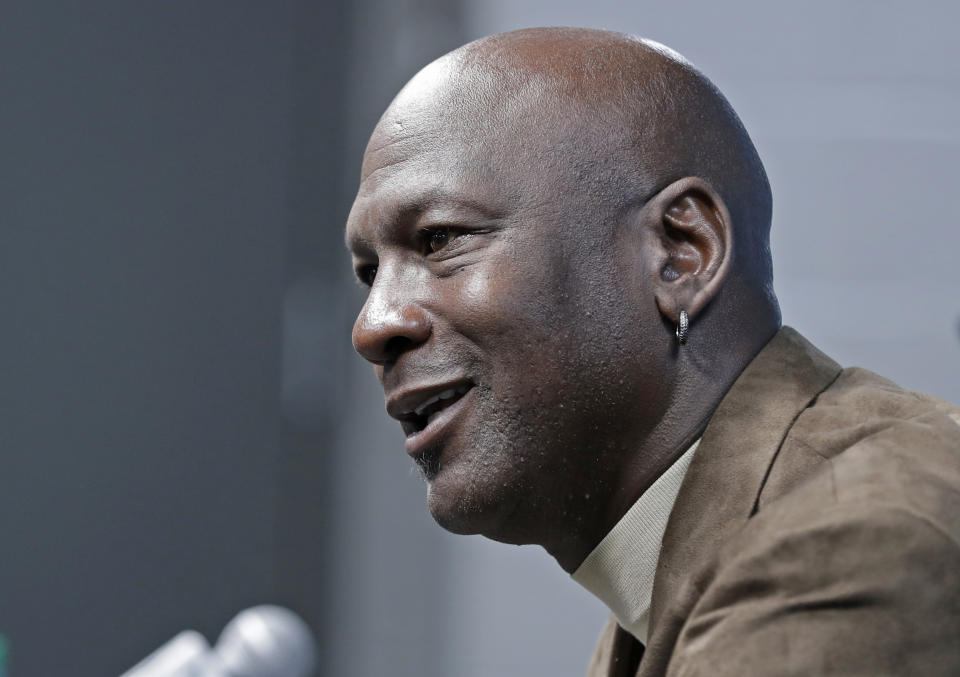Michael Jordan applauds athletes for using their platform for activism
Perhaps one of the most famous quotes attributed to Michael Jordan is his one about activism: “Republicans buy sneakers too.”
Whether or not he actually said that, Jordan made a concerted effort during his playing days to not rock the boat and give his political views. He carefully manicured his image to be as presentable to everyone as possible, especially as his brand took off.
But today’s NBA is far different, with the league’s best players and coaches offering impassioned thoughts on the topics de jour. That’s gotten the league in hot water with China and has cost the league millions upon millions of dollars, but Jordan said in an interview with TODAY’s Craig Melvin, which aired on Friday, that his thoughts on speaking out have changed with time.
“When I was playing, my vision and my tunnel vision was my craft,” Jordan said. “I was a professional basketball player and I tried to do that the best I could. Now I have more time to understand things around me, understand causes, understand issues and problems and commit my voice, my financial support, too.”
Notably, Jordan did not comment on the budding global crisis, in part because he said he has pending litigation since 2012 on the improper use of his name in China. But the Charlotte Hornets owner did note the opportunity players have to let their opinions have an impact.
“I think it’s great,” Jordan said. “If they understand the causes, obviously if they feel their voice matters, great. You know and I support that.”
Jordan has been more outspoken with time
Whatever shortcomings Jordan may have had as far as speaking his mind during his playing days, he’s making up for them now. No instance is clearer than his thoughts about police violence against African-Americans.
After a string of public officer-involved shootings in the summer of 2016, Jordan penned an op-ed in The Undefeated in which he felt like he could no longer keep his thoughts to himself, cautious thoughts be damned.
“As a proud American, a father who lost his own dad in a senseless act of violence, and a black man, I have been deeply troubled by the deaths of African-Americans at the hands of law enforcement and angered by the cowardly and hateful targeting and killing of police officers,” Jordan wrote. “I grieve with the families who have lost loved ones, as I know their pain all too well. ... I know this country is better than that, and I can no longer stay silent.”
Jordan not only spoke with his words but with his wallet. In that piece, he announced that he was donating $1 million each to the Community-Police Relations and the NAACP Legal Defense Fund. He’s also made seven-figure donations for multiple hurricane relief funds, his high school in Wilmington, N.C., and medical clinics in at-risk communities. His first of two clinics that he helped fund opened on Thursday.

Jordan voices support for college athletes to be paid
During the interview with Melvin, Jordan also offered his opinion on the NCAA, which has been a popular topic among players, especially after California passed a law that will allow student-athletes to make money off their likeness.
While he didn’t have an elegant solution, he is the latest former athlete to stand with players who are being profited off. Given that he is also in a position of authority in management, his words carry even more weight.
“I think they should be paid some portion of money so that their basic needs are taken care of. There’s some complexity there that I think the NCAA is going to have to figure out. Are they entitled to some compensation? Yes. What is that number? I don’t think anyone knows.”
Jordan played three years at North Carolina before going pro and launching his historic career.
More from Yahoo Sports:

 Yahoo Sports
Yahoo Sports 